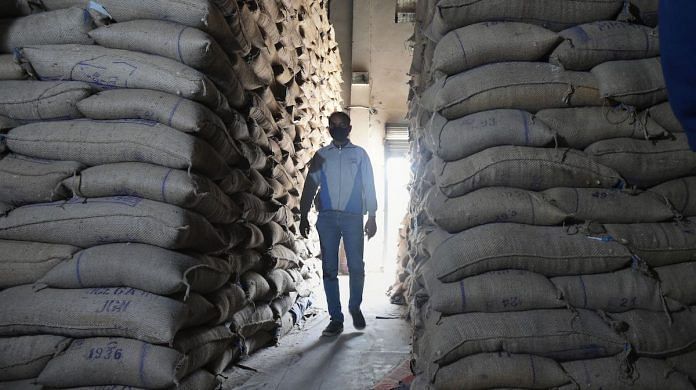New Delhi: The Food Corporation of India (FCI) says it has been supplying a record amount of wheat, rice and pulses to the states, which are meant for poor beneficiaries under the National Food Security Act (NFSA) and the recently-announced Pradhan Mantri Garib Kalyan Yojana (PMGKY).
Sources in the consumer affairs ministry, under which the FCI functions, however, have told ThePrint that foodgrain distribution by the states has been sluggish during the Covid-19 lockdown period despite the record supply.
While 81.35 crore beneficiaries are entitled to 5 kg of rice/wheat per person per month under the National Food Security Act, they get an additional 5 kg of foodgrains per person for the next three months under the recently announced PMGKY.
The sources said the FCI had supplied 40.03 lakh metric tonnes (LMT) as of 22 April but the states had only distributed 19.6 LMT to beneficiaries. Similarly, of the 81.35 crore beneficiaries of the PMGKY, only 39.27 crore have been given the foodgrains.
Also read: World awaits Alphonsos, but the mangoes are stuck in Konkan lockdown
Bihar & MP the worst offenders
According to an official in the Department of Food and Public Distribution under the Ministry of Consumer Affairs, Bihar is the worst performing state followed by Madhya Pradesh.
States such as Uttar Pradesh and Chhattisgarh, on the other hand, have been efficient in the disbursal of foodgrains under both schemes, the official added.
The official also said some states have implemented universalisation of PDS, meaning all beneficiaries are eligible for free ration even without a ration card.
“Bihar has only disbursed 63,280 Metric Tonnes ( MT) of wheat even though it picked up 7.3 LMT from FCI. Madhya Pradesh has only distributed 39,840 MT of wheat as against the 2.6 LMT it took from FCI,” said a second official, who did not want to be named.
“Uttar Pradesh has distributed 3.7 LMT of the around 5 LMT of wheat that the state lifted under PMGKY,” added the official. “Similarly, Chhattisgarh has distributed 0.8 LMT of the 2LMT wheat it picked up under PMGKY.”
Also read: Rabi procurement picks up amid lockdown, 4 states buy wheat despite labour shortage
Similar story in pulses
It is a similar story with pulses.
As of 22 April, only 10 per cent of the pulses promised under PMGKY have been distributed. According to central government data, the states have disbursed only 19,496 MT of pulses to beneficiaries from the total monthly allocation of 1.95 LMT.
But officials admit that only 1,22,312 MT of the monthly allocation of 1.95 LMT of pulses have been issued to the states. Of this, only 19,496 MT has been distributed among the beneficiaries.
Another official from the Ministry of Consumer Affairs said the reason for the backlog in foodgrain and pulse distribution under PMGKY was due to multiple state agencies procuring them.
“Prior to their PMGKY requisition, these states have lifted heavy amounts of foodgrain under the Open Market Sales Scheme (OMSS). This was to provide wheat to flour mills in the state and ease the supply constraint in the market,” the official said. “Along with this, district magistrates/ collectors were also directly lifting foodgrains from FCI depots.”
This foodgrain allocation, the official added, was over and above NFSA allotment and additional allocation was done under PMGKY. “Now, states are struggling to distribute it first to maintain the flour supply chain especially in urban areas leading to a slight delay in PMGKY foodgrain distribution,” the official said.
Scheme under fire
Even as the central government complains of poor distribution, the NFSA itself has come under fire over its list of beneficiaries.
Policy experts argue that since the National Food Security Act 2013 is based on the 2011 census, the ration cards won’t have the names of poor families added later.
While some states have allowed even those without a ration card to avail the free provisions, a majority hasn’t.
“The NFSA Act, 2013, is based on the 2011 census, which means those family members who were added after this census, conducted almost nine years ago, won’t have their names on the ration card,” Dipa Sinha, a teacher at Ambedkar University and a prominent member of the Right to Food Campaign, told Business Standard. “Secondly, as no new census had not been conducted after 2011 while the population has increased manifold during this period, a large chunk of the poor and needy don’t have ration cards and are hence not eligible for free ration.”
Also read: Fishing industry suffers another blow as workers are stranded on boats, debt is piling up



